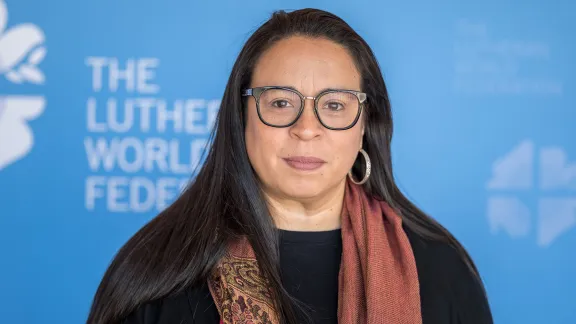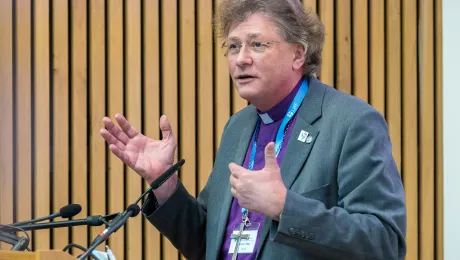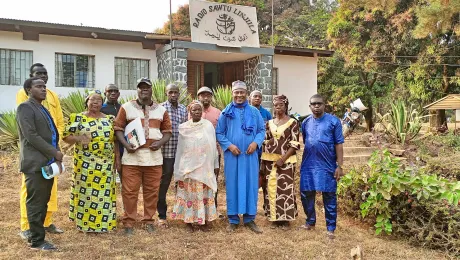
Bishop Leila Ortiz. Photo: LWF/Albin Hillert
Voices from the Communion: Bishop Leila Ortiz of ELCA’s Metropolitan Washington DC Synod
(LWI) - The first woman and the first person of color to lead the Metropolitan Washington DC Synod of the Evangelical Lutheran Church in American (ELCA). The first Latina bishop elected to serve in the domestic U.S. church. Bishop Leila Ortiz has been breaking a lot of stained-glass ceilings since her ordination as pastor in 2014.
Two years later, she joined the D.C. Synod staff and in 2019 she was elected and installed as bishop, one of the ELCA’s youngest leaders. It was an unusual and unexpected journey for Ortiz, who less than two decades earlier had been a struggling student at college in Puerto Rico, where she was a committed member of the Pentecostal church.
At the Lutheran World Federation (LWF) Assembly in Kraków last year, Ortiz was elected to serve as a Council member, a position which she says offers “a greater perspective on crises” affecting churches in the U.S. At the first Council meeting in Geneva in June, Ortiz sat down to discuss her faith journey and her conviction that, like the Jewish queen Esther, she has been called to serve “for such a time as this.”
You grew up in a Pentecostal church, didn’t you and you describe yourself as a ‘Luthercostal’?
Yes, when I was a child in Puerto Rico, and later in New York, my uncle was pastor of the Pentecostal church where we went to worship every day. There was always an altar call for people to make a public commitment to Jesus and there are photos of me as a little girl holding tightly onto my uncle’s hand on my head as he blessed me.
I was an only child and I didn’t have imaginary friends, but instead I had Jesus who I could talk to and who was always available for me. That church formation was where I met God and was introduced to the Holy Spirit, where I became enamored by the idea of discipleship and following Jesus’ way.
How did the move to the Lutheran church happen?
I was an honors student studying psychology in Puerto Rico, but then my mother became ill and my priorities shifted. The hospital and the church were my life and I fell badly behind in my studies.
Eventually, I told my mother and she picked up the phone to her sister in the Bronx. Two weeks later, in July 2000, I was on a plane to New York, with my parents following in November of that year. Since I moved to live with my aunt and she was married to a Lutheran pastor, there was an expectation that I would attend worship with them.
How easy was it to make that change?
To begin with I was really offended by the Lutheran church! I thought the images were heretical and I couldn’t understand why the font was so small as I had been baptized in a big pool. But most offensive to my 21-year-old mind was that the organ was foreign to my worship experience. I craved drums and guitars.
But in that place, I encountered the gospel anew and started working with kids in the church. Lots of new families began to turn up and my uncle suggested I had a call to ministry, so I enrolled in the seminary. One day in class, my professor was talking about justification and he said: “When you understand that God chose for you to be saved and you did not choose your own salvation, then you’ll understand God’s amazing grace.”
I had always been pursuing grace, but he talked about how God comes to us. That was like a conversion moment for me, like a breath of fresh air. I looked around at all the other students who were just taking notes, but I had never heard such a liberating word before. I realized that is the word I am called to preach and teach and share with others who are thirsty for God’s grace.
Can you explain what you mean when you say you are a ‘Luthercostal’ in your ministry today?
For me, it means bringing together two seemingly opposing religious experiences: Pentecostal formation and Lutheran Theology. I lean into the best of two worlds; my spiritual formation as a Pentecostal, which invites the move of the Holy Spirit in daily living and Lutheran theology, which articulates a word of grace, love, and accountability in matters of justice.
I am also very interested in the way that Latina women have a particular impact on Lutheran ecclesiology, how they follow Luther’s invitation to draw the spirit from the letter and engage with the word of God on a daily basis, not just on a Sunday morning.
You are the first woman and the first person of color to hold the position of bishop in the Metropolitan Washington DC Synod, aren’t you?
Yes, and I’m the first Latina in the ELCA to be elected in the domestic US. Sometimes that comes at a cost because the ELCA is a mainly white denomination. I had no idea that just showing up in my skin could be so demanding on my spirit and on my heart.
There have been heartbreaking moments and also many times when I’ve been grateful for the opportunities I’ve been given. Like Esther, I think that of all the seasons and of all the times in history, we were born at this time, and so we might as well show up and serve, with God’s help and in Jesus’ name.
What priorities have you set for yourself as bishop?
I was appointed in September 2019, just before the COVID pandemic. It has been such a difficult time, but also a holy time, because it is in times of change and crisis that the Spirit can activate newness and possibility.
My priority is to walk with leaders and congregations and give them permission to be imperfect and gracious with themselves. In the U.S. we are gifted at extending grace but not so good at receiving it. We tend to be perfectionists, high performers, and we connect performance with our value. But Lutheran theology gives us permission to show up as we are, broken, messy, fractured, healing, and not have to pretend. I pray we seek faithfulness, not perfection.
I want to remind our leaders that we are human, that it is OK to grieve because we have all lost something or someone, people, resources, memberships, control. I want to provide resources, to encourage them to partner with others so that we don’t have to reinvent the wheel. Above all, I want to invite people into a relationship with Jesus which becomes relationship with one another, so my priority is creating space for those relationships.
What does it mean for you and your church to be a part of the global communion of churches?
For me it is an opportunity to learn, to experience other churches and to have a greater perspective of our own crises and realities. For the ELCA it is essential to be part of this wider communion. When all we see are our own personal or systemic circumstances, we grow to believe we are the center of it all, but this space reminds us that we are part of a communion with the gospel of Jesus at the center.
I am so grateful for this opportunity to serve on the LWF Council, for the vision and the insistence on being church together, despite of and because of it all.


